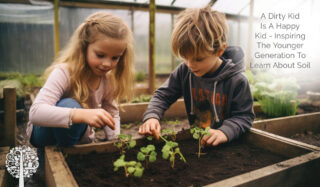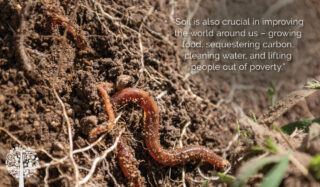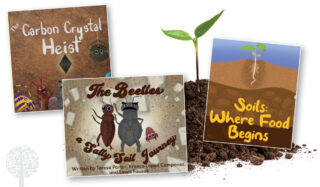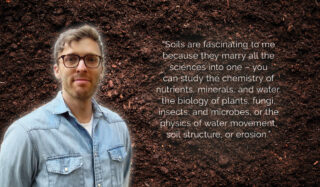A Dirty Kid Is A Happy Kid – Inspiring The Younger Generation To Love Soil
Garden Culture’s Jennifer Cole chats with children’s book author and soil expert Lewis Fausak in honor of World Soil Day, which takes place annually on December 5th.
Lewis Fausak is passionate about soil; he studies it as an applied biology education and research technician in the Faculty of Land and Food Systems at the University of British Columbia. He also writes and illustrates children’s books about soil.

For the past few years, there’s been a push to draw attention to World Soil Day and how imperative healthy soil is to the planet. The Food and Agriculture Organisation (FAO) of the United Nations, the International Union of Soil Sciences (IUSS), and the Global Soil Partnership (GSP) have invited educators and soil enthusiasts from around the world to enter a children’s book contest and write about soil. In 2021, “The Beetles: A Salty Soil Adventure,” co-authored by Fausak and fellow soil enthusiasts, won first prize. This book draws attention to the dangers of soil salinity around the world.
GCM: What sparked your interest in soil science as a career?
LF: In high school, I was always interested in science: biology, chemistry, and physics. I took the “Introduction to Soil Science” course and was hooked. Soils are fascinating to me because they marry all the sciences into one – you can study the chemistry of nutrients, minerals, and water, the biology of plants, fungi, insects, and microbes, or the physics of water movement, soil structure, or erosion. Soil is also crucial in improving the world around us – growing food, sequestering carbon, cleaning water, and lifting people out of poverty.
GCM: How did you get involved with the FAO’s book contest?
LF: In 2020, the FAO launched a children’s booklet competition about soil science with the theme of soil biodiversity. I thought it would be a chance to flex my creative muscles and integrate soil science in a fun way that would excite people about soil’s importance. The Carbon Crystal Heist in 2020 was all about the soil’s ability to sequester carbon. In 2021, the theme was soil salinity and its dangers. “The Beetles: A Salty Soil Adventure” won first prize. Last year, the theme was regenerative agriculture, and we entered “Soils: Where Food Begins.”
GCM: What can you tell us about your new book on soil?
LF: I’ve started creating a story surrounding some of the artwork I have done for my Instagram. It will be a children’s book about a young scientist who discovers and learns about soil science and soils worldwide through the soil characters I create.
GCM: What is the most important thing everyone needs to know about soil?
LF: Soil is a non-renewable resource. It takes anywhere between 100-1000 years to create just one centimeter of soil! It’s estimated that 30-40% of the earth’s soils are degraded (carbon loss, erosion, salinisation, etc.). This means they’ve experienced a loss in their ability to support plant growth and perform essential ecosystem functions like filtering water, sequestering carbon, nutrient cycling, and supporting biodiversity.
GCM: On World Soil Day, what is the most important message you can pass on about saving and preserving the world’s soil?
LF: Without soil, we would not have clean drinking water. We wouldn’t have all the natural ecosystems and biodiversity to explore and inspire us, like big trees, interesting mushrooms, bugs, bears, and other animals. And we wouldn’t have the variety of foods we like to enjoy. I think we need to shift our values and attitudes around soil, which will guide us in treating this invaluable resource essential to sustaining life.
To read Fausak’s winning book, “The Beetles: A Salty Soil Adventure,” and all the other entries in the competition, check out The Beetles: A Salty Soil Adventure: rb.gy/qhdlno.
To learn more about the fun and wild world of soil, follow Fausak’s Instagram: @adventures_in_soil.







